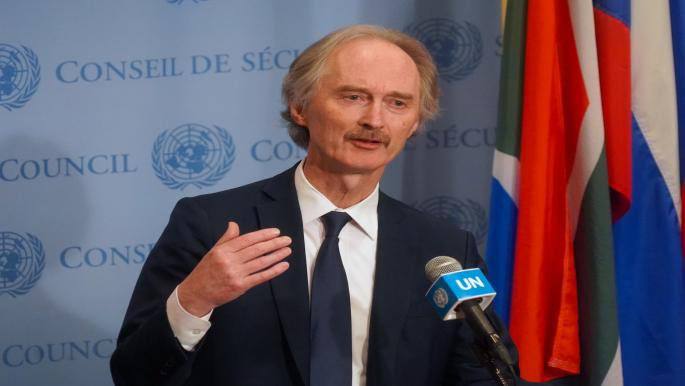UN Special Envoy to Syria, Geir Pedersen, warned of continued escalation and continued suffering and violence on Syrians. This came during his monthly briefing to the Security Council on the situation in Syria, on Wednesday.
“The past month alone has witnessed airstrikes in Idleb that have killed civilians, damaged infrastructure, mutual shelling across front lines, outbreaks of hostilities in the northeast, and improvised explosive device attacks that killed civilians in northern Syria,” Pedersen said.
“Israeli airstrikes have damaged the port of Lattakia,” he said. He noted that “there has been continued violence in the south, an increasing number of security incidents related to drug trafficking, and ISIS attacks, including ones against civilians and humanitarian actors, in the northeast and central Syria.”
“14 million Syrians now need humanitarian assistance. More than 12 million Syrians remain displaced, many of whom now face harsh winter conditions. Tens of thousands are detained, kidnapped, or missing.”
“The Syrian economy has collapsed and crime is flourishing,” he said, pointing out that many young people are seeking to leave the country and get a chance outside Syria, making them targets to human traffickers and warlords.
Pedersen described the state of education in Syria as deteriorating, as are institutions and infrastructure in all areas.
Read Also: Guterres: Syrian-led Constitutional Committee Should Reconvene
“Despite the continuing violence and suffering, it is also clear that there is a strategic impasse. There have been no shifts on the front lines in almost two years.”
“There is no actor or group of actors who can determine the course or outcome of the conflict,” he said, stressing that “none of the conflict’s parties can resolve it through a military solution.” He believed that if this could be achieved, it is “an illusion.”
He called for “serious diplomatic discussions on a range of steps that could begin to influence the dynamics of the conflict, build some trust between and among Syrians and international stakeholders, and make step-by-step progress within the framework of Resolution 2254.”
He also declared that he was “actively engaged in the quest to reconvene the Constitutional Committee’s meeting”, saying that “the work of the Committee so far remains disappointing. The current challenge is to ensure that delegations not only put forward constitutional texts, but are willing to review them in the light of the discussions, try to find common ground, or at least to bridge differences in positions.” “We need a productive drafting process in accordance with the committee’s mandate. As its terms of reference are set, the Committee must act promptly and continuously to achieve results and continued progress.”
He noted his continued involvement with both co-chairs of the Constitutional Committee (Hadi al-Bahra of the opposition, and Ahmed Kuzbari as a representative of the Syrian regime), “in an attempt to reach a clear understanding”. He referred to ideas put forward in this context without naming them and expressed his readiness to hold a seventh meeting of the Constitutional Committee in Geneva as soon as an understanding is reached. He expressed hope that this would be done in the coming months.
This article was translated and edited by The Syrian Observer. The Syrian Observer has not verified the content of this story. Responsibility for the information and views set out in this article lies entirely with the author.


